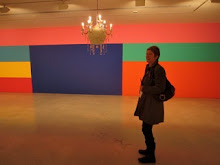In the US one in 31 adults is under some form of correctional control and one in a hundred adults is in gaol.
In a article in a recent issue of american craft (June/July 2010), Meribah Knight describes a visit to the Jefferson City Correctional Center, a maximum-security state prison where male inmates can volunteer for a number of activities, including quiltmaking, as a way of giving back something to society. The quilts are given away or auctioned for charity and last year raised $7,000.
"Now, they say, quilting quiets their minds and helps rectify their pasts" (p57) and JCCC has the lowest rate of misconduct and violence when compared to other facilities of the same or lesser security around the state (p60).
Meribah Knight, 'Breaking Patterns: Prisoners Piece Together Their Lives One Quilt Block at a Time', in american craft (June/July 2010) 57-60
Judy McDermott taught pottery to inmates at Long Bay Gaol, Malabar (a suburb of Sydney). Her quilt series, 'The Big House' first exhibited in 1999, explores her experience of travelling from her home north of Sydney to the gaol.
Judy McDermott, Go To Gaol (diptych) 1995-1998
#2 110x75cm, #1 100x60cm
(Photograph A Payne)
#2 110x75cm, #1 100x60cm
(Photograph A Payne)


